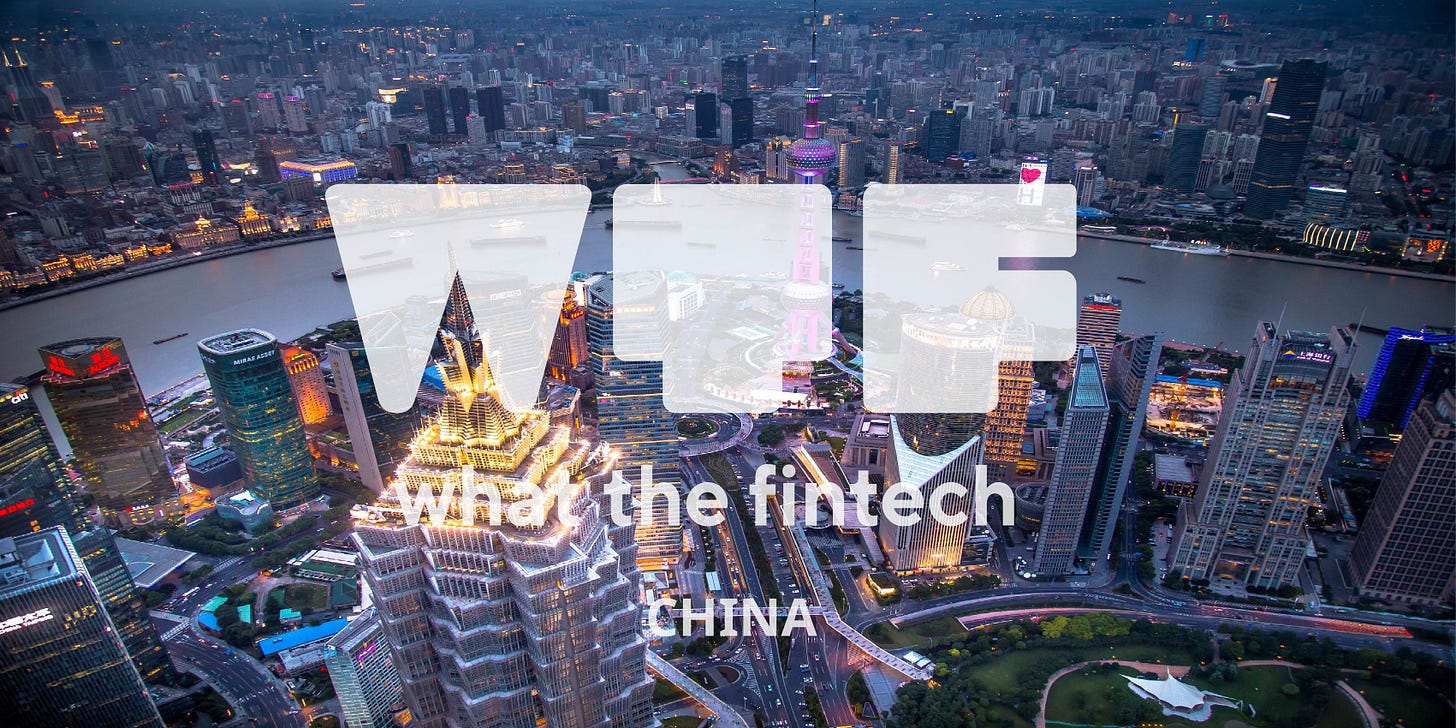What The FinTech #131 - 5 Mar 2023
Get the inside scoop on the latest FinTech and innovation news from Asia with What The FinTech, your go-to source for weekly top headlines and insights from the industry.
Stay ahead of the curve by subscribing to our Newsletter. Each week, we'll deliver the latest trends, technologies, and startups that are shaping the future of finance straight to your inbox.
Don't forget to like, comment and share to help us reach more people who share our passion!
Join our community of FinTech enthusiasts and subscribe today!
-
Substack Newsletter
You can now find this newsletter on substack - click on subscribe to follow it.
What The FinTech Episode 53 - Divit
I had an enlightening conversation with David Du, Co-founder of Divit, a pioneering real-time payment-linked loyalty and rewards platform that enables consumers to instantly earn and spend miles with any FPS payment, a real-time gross settlement paymen With their strategic airline partnerships, Divit let members earn miles faster, and spend miles easier.
🎁 Exclusive Offer 🎁 : Sign up to #divit with this link gets 100 bonus miles:
Check out the previous videos here: on What The FinTech, Instagram or Youtube.
The previous interviews are available on podcast: Spotify, Apple Podcasts, Google Podcasts.
-
Don't miss out on "What The FinTech" live at the Amazon Web Services (AWS) Industry Forum Hong Kong - Financial Services on March 22, 2023.
Tune in to our channel and be at the forefront of the latest technology trends in financial services. This is your chance to connect with a dynamic community of industry leaders, cloud experts, and partners.
Register now and be part of the conversation! Click this link to join: https://bit.ly/3xPmSsk.
-
What was the FinTech this week in: 📰
HONG KONG
1. Hong Kong aims to develop its own ChatGPT-like platform based on artificial intelligence; technology chief says
2. HSBC grants its first green loan in Hong Kong
Hong Kong aims to develop its own artificial intelligence-based chatbot platform, like the popular ChatGPT, to catch up in the global race for innovation, the city’s technology chief has said. Secretary for Innovation, Technology and Industry Sun Dong on Saturday also said authorities would conduct a public consultation this year on plans to set up an artificial intelligence (AI) supercomputing center to attract top talent and technology enterprises to Hong Kong. He outlined his AI vision after revealing plans earlier to establish a special task force to recommend the best way to navigate “revolutionary” disruption caused by the controversial ChatGPT, including the option of using legislation to regulate the technology.
HSBC grants its first green loan in Hong Kong
HSBC has granted its first green loan to a climate-mitigation technology firm, fighting global warming by financing clients’ emissions reduction projects. Ampd Energy has received a USD 8 million two-year loan from the UK-based lender to fund its massive batteries placed on building sites. By reducing the need for diesel generators, the batteries assist construction companies and property developers in lowering their carbon footprints. HSBC grants its first green loan to a climate-mitigation technology firm, fighting global warming by financing clients’ emissions reduction projects. Even when the carbon emissions of energy generation are included, the total carbon footprint of battery systems is at least 85% less than that of diesel generators. This equates to a decrease of about 17,500 tonnes of CO2 emissions per year.
SINGAPORE
1. OCBC Bank, TTAB, BFSU to curate first industry training program to enhance job matching for technology roles in banking industry
2. Singapore's top three banks hired more than 8,000 staff last year
OCBC Bank, Tech Talent Assembly (TTAB), and the Banking and Financial Services Union (BFSU) have inked a partnership to introduce a new training programme aimed at providing info-communications and technology (ICT) professionals with better employment outcomes in the banking industry. The partnership is in line with the government’s goal to strengthen the training and placement ecosystem with the newly announced Jobs-Skills Integrator initiative at the Budget 2023. The training curriculum in this programme focuses on different technology modules covering DevOps, full stack development, data engineering and blockchain, amongst others, which are curated for the purpose of landing a technology job in the banking industry. It will also provide participants a better understanding of the banking industry and the application of the technologies.
Singapore's top three banks hired more than 8,000 staff last year
Singapore’s top three banks expanded headcount and paid staff more in 2022 after they each reported record profits. DBS Group, the biggest bank in Singapore, hired 3,073 people last year, a 9% rise in 2021. The hiring spree pushed staff costs up 13% to S$4.4bn (U$3.3bn) while the bank also paid a one-time special award to all of its staff after net profits jumped by a fifth to a record S$8.2bn. Oversea Banking Corporation (OCB) and United Overseas Bank (UOB), Singapore’s second and third largest banks respectively, didn’t disclose whether they lavished staff with one-off awards like their bigger rival, but both said they grew headcount and posted record profits.
CHINA
1. China's Digital Yuan Fails to Gain Traction with Hong Kong Visitors – Is China's Digital Currency Facing a Roadblock?
2. Alibaba and Ant venture to launch RISC-V chips for payments
3. China’s Digital Yuan can now be used to pay highway toll fees on major routes
4. Shanghai Commercial Bank chooses Salt Edge for open banking compliance
5. Tencent to provide metaverse building services in Asia
Shenzhen, China has initiated a scheme to promote the usage of its digital yuan among Hong Kong tourists by providing them with physical cards and discounts. However, the initial response during the first few days appears to have been lackluster. Per Shenzhen News, the country's first digital yuan hard wallet self-service card issuing machine was officially launched on February 22, providing "convenient" CBDC payment services for people coming to Shenzhen and Hong Kong. The goal was to issue 50,000 digital yuan hard wallets until March 31. Yet, out of some 7.5 million Hong Kong residents, fewer than 1,000 have so far used this option. Citing data from the Shenzhen branch of the People's Bank of China (PBOC), the report stated that, as of February 26, 625 Hong Kong residents have applied for a digital yuan hard wallet.
Alibaba and Ant venture to launch RISC-V chips for payments
Alibaba Group Holding's (9988.HK) chip unit T-Head and Alipay, the payment service under Alibaba's financial affiliate Ant Group, will release computing chips for secure payments based on the RISC-V instruction set architecture, the two entities said. The development comes as Chinese companies continue to invest heavily in chips, in the wake of U.S. export restrictions targeting China's semiconductor sector. The chip will be embedded in hardware devices and used to enhance mobile payments, which are popular in China via the use of QR codes, Alipay and T-Head said on Thursday.
China’s Digital Yuan can now be used to pay highway toll fees on major routes
China’s digital yuan adoption drive is now focusing on transport networks. And drivers have been green-lighted to use the token to pay tolls on some of the nation’s busiest highways. Per Shenzhen Securities Times and Sina Finance, Jiangsu Province’s Department of Transport has announced that toll booths on sections of Nanjing’s various expressway routes have been upgraded to allow drivers to pay toll fees using the coin. Drivers will be able to pass through booths and tap their mobile phones on card readers – with fees subtracted from their digital yuan wallets in real-time. Toll booths on highway routes into and out of the city of Nanjing have all been updated to allow drivers to pay with the central bank-issued coin. The province is also rolling out the solution on a section of the Changshu–Taizhou Expressway, as well as two sections of the Changshu–Jiashan Expressway. It announced that it planned to “gradually” roll the solution out to the “entire province’s” highway network.
Shanghai Commercial Bank chooses Salt Edge for open banking compliance
Shanghai Commercial Bank (“ShaComBank”), an international bank based in Hong Kong offering banking and financial services across the world, including the UK, joined forces with Salt Edge, a pioneer in open banking, to leverage PSD2 possibilities and create a bespoke banking experience for its customers. ShaComBank is one of the most prestigious local Chinese banks in Hong Kong. With a business network spanning all over the world, the bank offers a wide range of comprehensive banking products and services to individuals and corporations in the UK, mainland China, Hong Kong and Taiwan, all designed and provided under the motto – “For Personalised Service.”
Tencent to provide metaverse building services in Asia
China-based software and tech company Tencent has announced its metaverse service suite targeted at Asian countries such as Singapore and Thailand. The company’s ‘metaverse-in-a-box’ proposal aims to make it easier for third-party companies to build virtual worlds. The company has decided to offer these services through its cloud division in a move that aims to complement the media services offering launched by Tencent in 2022. Companies that operate in fields such as gaming, media, entertainment, and retail will be able to use these tools to build and design metaverse spaces. The metaverse service suite is aimed at Asian markets such as Malaysia, Indonesia, Thailand, and Singapore. Tencent representatives cited by news.bitcoin.com revealed the company’s goals of adapting to an efficient, transparent digital future by leveraging its technical expertise when it comes to games, audio, and video, and providing technical support for Web3. The company also wants to work with industry partners to create a more immersive experience and support a better Web3 ecosystem.
ASIA
1. Banks back 'Japan Metaverse Economic Zone'
2. Coda Payments links with Know Your Customer to deliver corporate onboarding
3. Brankas launches Asia Pacific's first multi-bank API for instant account opening
4. AWS expands SEA footprint with a cloud region and US$6 billion investment in Malaysia
5. Sequoia heats up early-stage startup investments in India and Southeast Asia
6. Mastercard and Vesta offer digital fraud detection solutions for Asia Pacific
Banks back 'Japan Metaverse Economic Zone'
Major Japanese banks and tech firms have banded together on a metaverse infrastructure project that will, among other things, provide payments, authentication, and insurance services for users across platforms. The new open metaverse infrastructure, called Ryugukoku, will use the metaverse construction framework Pegasus World Kit, developed by TBT Lab Group-owned JP Games. Backed by the likes of Fujitsu, this infrastructure will enable interoperability between, and collaboration among, different metaverse platforms. Ryugukoku will have elements of an online alternate-world role-playing game based on a unique fantasy worldview of its own. The world will be underpinned by a "Japan Metaverse Economic Zone" backed by Mizuho Financial Group, Sumitomo Mitsui Financial Group, Mitsubishi UFJ Financial Group and Sompo Japan Insurance. This will ensure that users can access identity authentication, various payment options, data infrastructure and insurance. Ryugukoku will have a "multi magic passport, an authentication certificate with a payment function that allows users to freely travel to and from Metaverse services. In addition to ID authentication and payment methods, the passport can register useful information for users to spend time in the virtual world, such as NFT, items, avatar skin, and avatar memory.
Coda Payments links with Know Your Customer to deliver corporate onboarding
Coda Payments, a provider of cross-border payments and distribution solutions, has partnered with Know Your Customer to boost corporate onboarding in APAC. According to Know Your Customer, the partnership will help Coda simplify and accelerate its corporate onboarding processes across the Asia Pacific region. By integrating Know Your Customer’s corporate onboarding solution with its front-end and back-end operations, Coda is streamlining its due diligence operations on business prospects and clients, leveraging automation to achieve greater efficiency and an improved customer experience. Coda will use Know Your Customer’s single API to connect to company registries across 127 countries globally in real-time, retrieve the necessary official documents automatically, extract vital corporate information, unravel complex company charts, and identify ultimate beneficial owners through documentary evidence as required by regulations.
Brankas launches Asia Pacific's first multi-bank API for instant account opening
Open finance company Brankas has announced a new feature enabling instant bank account opening as an "embedded finance" experience on third-party applications. The API is the first of its kind in the region, launched first in Indonesia and the Philippines. As a bundle with Brankas' data and payment solutions, any merchant or consumer app can provide fintech experiences to their users. Using the new Account Opening API as part of Brankas’ wider banking API suite, companies offering financial management, e-wallets, brokerages and more can now offer their users interest-bearing, regulated savings accounts as an embedded feature. HR platforms, ecommerce marketplaces and lenders can also provide users with savings accounts for collections and disbursements. For businesses that sell through micro-merchants, the new Brankas solution could open up a new revenue stream by enabling the onboarding of customers in rural areas, which unlocks the use of e-wallets and BNPL. Most businesses will be able to test the API and go live in less than a week. At present, Brankas' Account Opening APIs supports account creation for OCBC NISP, Danamon, and BNC in Indonesia. Brankas also offers retail and corporate account creation in the Philippines, powered by Netbank.
AWS expands SEA footprint with a cloud region and US$6 billion investment in Malaysia
Amazon Web Services (AWS), the cloud computing arm of Amazon.com, Inc., will launch a new cloud region in Malaysia, expanding its footprint in the Southeast Asian region. The cloud giant is also committed to investing US$6 billion (RM25.5 billion) in Malaysia in the next 14 years to keep up with the rapid adoption of cloud services while meeting the data residency requirements of local customers. The move came four months after AWS announced a similar move in Bangkok, Thailand. However, the cloud firm did not disclose a launch date for Malaysia’s cloud region. “We plan to invest at least US$6 Billion in Malaysia by 2037,” AWS regional managing director for the worldwide public sector in Asean Eric Conrad shared, adding that many organizations in Malaysia are already using the existing AWS Regions.
Sequoia heats up early-stage startup investments in India and Southeast Asia
The Sequoia India and SEA partners spent the next two hours walking founders through a dozen slides, emphasizing that consistent growth over a long period of time — even if not skyrocketing quarter over quarter — can conjure trillion-dollar companies. Undergirding their strong conviction is a bet that India and Indonesia and other markets in South Asia will double and triple their GDPs in the next 10 to 15 years, and the public markets and tech companies stand to take a significantly broader role in that surge. The combined market cap of top-five tech companies in the U.S. is over $7 trillion, contributing to over a quarter of the nation’s GDP. The top five tech firms in China, with a market cap of over $1 trillion, contribute 7% to the nation’s GDP. But top five tech companies in India and Southeast Asia have a market cap of just $140 billion, accounting for only 2% of their GDPs. The 12 startups gathered in the presentation hall had been hand-picked from about 3,600 applicants for the latest cohort of Sequoia’s four-year-old early-stage-focused Surge program. Surge launches two cohorts every year, featuring between 10 and 20 startups each. Sequoia has “codified” its learning from over 50 years to assess the areas where a founder needs help in their journey and the roadblocks they will likely encounter, said Anandan in an interview.
Mastercard and Vesta offer digital fraud detection solutions for Asia Pacific
Mastercard has partnered with fraud protection platform Vesta to deliver innovative fraud management solution for merchants in Asia Pacific. The partnership will involve the integration of Mastercard’s Cyber & Intelligence (C&I) products and solutions into Vesta’s transaction guarantee platform, and will allow merchants to eliminate online fraud, approve more transactions, and grow their business. Mastercard’s collaboration with Vesta also reflects the company’s ongoing investments in cyber capabilities that bolster the wider ecosystem. The combination of cyber security solutions, including behavioural biometrics, pre-dispute resolution, identity verification, and Mastercard’s market expertise, will provide merchants with 100% fraud chargeback protection, whilst also incorporating transactional insights such as payment risk scores and pre-emptive chargeback alerts.
-
Please contact me if you’re interested in sponsoring the newsletter.
I hope you find the information provided in this newsletter to be informative and helpful.
To ensure that I am addressing the topics that are most important to you, I would welcome your feedback and suggestions.
Follow me on Twitter @medhy_souidi & Telegram to get the annotated edition of this newsletter on Monday or Tuesday. Plus I tweet most of what makes it into the newsletter.
=> Follow me on LinkedIn / Instagram / Twitter / YouTube / Telegram








